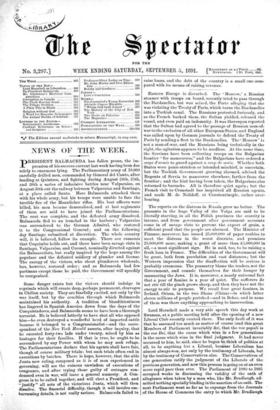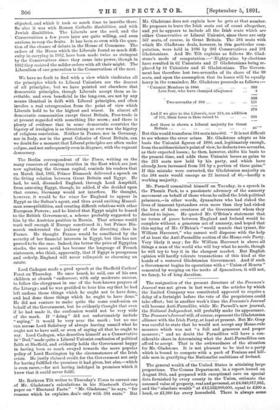Lord Herschell made a very able speech this day week
at Swansea, at a public meeting held after the opening of a new Liberal Club recently erected there. The only fault of it was that he assumed too much as matter of course (and this great Members of Parliament invariably do), that the vox populi is the vox Dei, that the cause which wins in a few generations is the cause which wins in the final judgment. It had never occurred to him, he said, since he began to think of politics at all, to be anything but a Liberal, because Liberalism has ahnost always won, not only by the testimony of Liberals, but by the testimony of Conservatives also. The Conservatives of one generation ratify the judgment of the Liberals of the previous generation, and now this process is going on at an even more rapid pace than ever. The Parliament of 1880 to 1885 occupied weeks in discussing the validity of the oath of allegiance when taken by a man who, like Mr. Bradlaugh, ad- mitted nothing speciallybinding in the sanction of an oath. The next Parliament went so far as to expunge from the Journals of the House of Commons the entry to which Mr. Bradlaugh
objected, and which it took so much time to inscribe there. So also it was with Roman Catholic disabilities, and with Jewish disabilities. The Liberals sow the seed, and the Conservatives a few years later are quite willing, and even anxious, to reap the fruits. It has been so even with the ques- tion of the closure of debate in the House of Commons. The orders of the House which the Liberals found so much diffi- culty in carrying in 1882, have been made twice as stringent by the Conservatives since they came into power, though in 1882 they resisted the milder orders with all their might. The Liberalism of one generation is the Conservatism of the next.



































